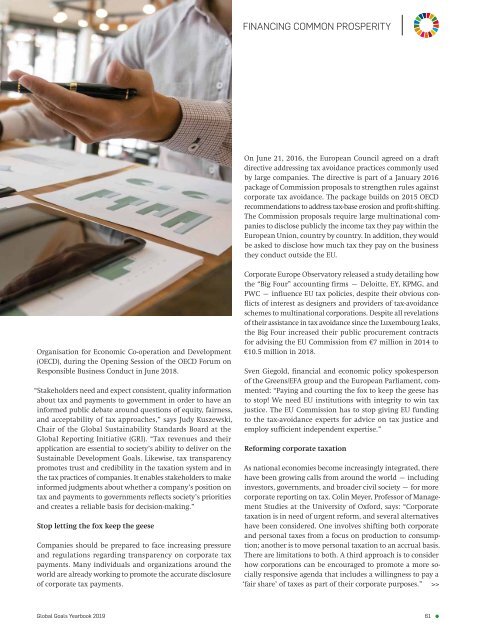Aliging Profit with Purpose - Global Goals Yearbook 2019
What are companies for? The rules for companies have changed. The focus is increasingly on their sustainable, social, and ecological impacts. The strategic orientation toward the so-called corporate purpose is decisive for profitable growth in the future. This currently results in a large number of questions for businesses: How do you find an inspiring and future-oriented corporate purpose, and how can it be aligned in such a way that it brings profitable growth and social responsibility in concert? The new 2019 edition of the Global Goals Yearbook offers answers to these crucial questions thanks to its consistent orientation toward the UN Sustainable Development Goals and a competent editorial board and author pool.
What are companies for? The rules for companies have changed. The focus is increasingly on their sustainable, social, and ecological impacts. The strategic orientation toward the so-called corporate purpose is decisive for profitable growth in the future.
This currently results in a large number of questions for businesses: How do you find an inspiring and future-oriented corporate purpose, and how can it be aligned in such a way that it brings profitable growth and social responsibility in concert? The new 2019 edition of the Global Goals Yearbook offers answers to these crucial questions thanks to its consistent orientation toward the UN Sustainable Development Goals and a competent editorial board and author pool.
You also want an ePaper? Increase the reach of your titles
YUMPU automatically turns print PDFs into web optimized ePapers that Google loves.
FINANCING COMMON PROSPERITY<br />
On June 21, 2016, the European Council agreed on a draft<br />
directive addressing tax avoidance practices commonly used<br />
by large companies. The directive is part of a January 2016<br />
package of Commission proposals to strengthen rules against<br />
corporate tax avoidance. The package builds on 2015 OECD<br />
recommendations to address tax-base erosion and profit-shifting.<br />
The Commission proposals require large multinational companies<br />
to disclose publicly the income tax they pay <strong>with</strong>in the<br />
European Union, country by country. In addition, they would<br />
be asked to disclose how much tax they pay on the business<br />
they conduct outside the EU.<br />
Organisation for Economic Co-operation and Development<br />
(OECD), during the Opening Session of the OECD Forum on<br />
Responsible Business Conduct in June 2018.<br />
“Stakeholders need and expect consistent, quality information<br />
about tax and payments to government in order to have an<br />
informed public debate around questions of equity, fairness,<br />
and acceptability of tax approaches,” says Judy Kuszewski,<br />
Chair of the <strong>Global</strong> Sustainability Standards Board at the<br />
<strong>Global</strong> Reporting Initiative (GRI). “Tax revenues and their<br />
application are essential to society’s ability to deliver on the<br />
Sustainable Development <strong>Goals</strong>. Likewise, tax transparency<br />
promotes trust and credibility in the taxation system and in<br />
the tax practices of companies. It enables stakeholders to make<br />
informed judgments about whether a company’s position on<br />
tax and payments to governments reflects society’s priorities<br />
and creates a reliable basis for decision-making.”<br />
Stop letting the fox keep the geese<br />
Companies should be prepared to face increasing pressure<br />
and regulations regarding transparency on corporate tax<br />
payments. Many individuals and organizations around the<br />
world are already working to promote the accurate disclosure<br />
of corporate tax payments.<br />
Corporate Europe Observatory released a study detailing how<br />
the “Big Four” accounting firms – Deloitte, EY, KPMG, and<br />
PWC – influence EU tax policies, despite their obvious conflicts<br />
of interest as designers and providers of tax-avoidance<br />
schemes to multinational corporations. Despite all revelations<br />
of their assistance in tax avoidance since the Luxembourg Leaks,<br />
the Big Four increased their public procurement contracts<br />
for advising the EU Commission from €7 million in 2014 to<br />
€10.5 million in 2018.<br />
Sven Giegold, financial and economic policy spokesperson<br />
of the Greens/EFA group and the European Parliament, commented:<br />
“Paying and courting the fox to keep the geese has<br />
to stop! We need EU institutions <strong>with</strong> integrity to win tax<br />
justice. The EU Commission has to stop giving EU funding<br />
to the tax-avoidance experts for advice on tax justice and<br />
employ sufficient independent expertise.”<br />
Reforming corporate taxation<br />
As national economies become increasingly integrated, there<br />
have been growing calls from around the world – including<br />
investors, governments, and broader civil society – for more<br />
corporate reporting on tax. Colin Meyer, Professor of Management<br />
Studies at the University of Oxford, says: “Corporate<br />
taxation is in need of urgent reform, and several alternatives<br />
have been considered. One involves shifting both corporate<br />
and personal taxes from a focus on production to consumption;<br />
another is to move personal taxation to an accrual basis.<br />
There are limitations to both. A third approach is to consider<br />
how corporations can be encouraged to promote a more socially<br />
responsive agenda that includes a willingness to pay a<br />
‘fair share’ of taxes as part of their corporate purposes.” >><br />
<strong>Global</strong> <strong>Goals</strong> <strong>Yearbook</strong> <strong>2019</strong><br />
61

















